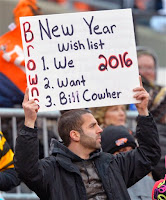Thank you readers ... for some unexplained reason visits to this blog have increased dramatically over the last few months (have I been discovered?) -- this month alone there were over 7,100 views and all-time visits just topped 19,000! Again thank you.
Some quick news: my ABA Forum on Franchising colleague and VERY good friend, Ken Milner, just reported a "Holiday Present for Franchisors in PA" via the ABA Forum List-Serv. This is another chink in the "joint-employer" stance. The Pennsylvania Supreme Court let a lower court's decision stand that held that a franchisor was NOT a joint employer of an employee of a Saladworks' franchisee, at least in regard to being liable for workers compensation payments. (lower court decision: Saladworks, LLC, et al v. WCAB (Gaudioso), et al, No. 1789 C.D. 2014, decided October 6, 2015) Thanks Ken! As noted in my last post (Joint Employer Controversy ... Trumped?) , perhaps 2017 will see the demise of this ill-begotten theory (at least in the franchise context).
And here is a "Holiday Present" for you -- this year I had the privilege of working with Bethany Appleby (Wiggin & Dana, LLP) in presenting our paper at the ABA Forum on Franchising's Annual Meeting in November - Show Me the Money! Maximizing Monetary Recovery in Franchise Cases. If you are interested in that sort of thing -- here's a copy for you.
Wishing you a Successful 2017!
















